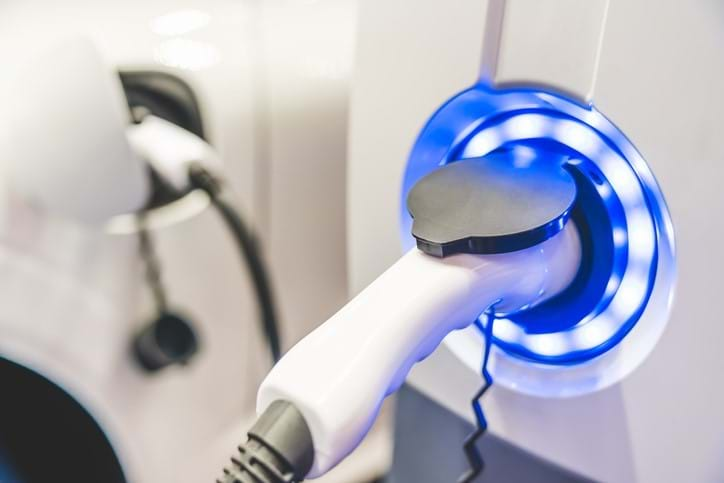Why electric vehicle charging is this decade’s big green tech opportunity
Read time: 3 minutes

Read time: 3 minutes

Decarbonising the UK’s transport system is a monumental task. Transport is responsible for a fifth of the UK’s greenhouse gas emissions, and progress has flatlined. While not a silver bullet, electric vehicles (EVs) will play a crucial role bringing emissions down over the coming years.
In 2020, the government brought forward its planned ban on the sale of new petrol and diesel cars from 2040 to 2035, and then again to 2030 a few months later. Vans will join them by 2035 and, under current proposals, all HGVs by 2040.
The resulting shift towards EVs is gathering pace. There were almost 400,000 plug-in electric vehicles on our roads by the end of 2020, and one in seven new cars sold so far in 2021 have a plug. Here in the North West, electricity network operator Electricity North West expects to support up to a million EVs by 2030. Even in the slowest scenario, where the region falls behind on its climate change targets, there would still be more than half a million electric cars and vans in our region by the end of the decade.
For all of this to be possible, a colossal investment in charging infrastructure is required. There are currently 25,000 publicly available charge points in place around the country, and Ofgem has recently announced a £300 million investment to install a further 3,500 over the next two years. But this is a drop in the ocean – another 375,000 are estimated to be needed by 2035 to keep up with demand.
That number excludes private home and workplace chargers, which already number over 190,000 in the UK. Much of the demand is coming from businesses. Around two thirds of new EV registrations in 2020 were for company cars, and business investment in EVs is expected to reach nearly £16 billion in 2021 – a 50% uplift on 2020, despite the ongoing impact of the pandemic.
Pressure to meet corporate sustainability targets is rising. Clean Air Zones that penalise older, polluting commercial vehicles will soon be a reality in city regions like Greater Manchester (and already are in some areas, including Birmingham). EVs continue to offer attractive subsidy and tax benefits, as well as lower maintenance and whole-life costs. And they’re a perfect accompaniment to the now common sight of solar PV systems on rooftops.
According to Centra Business Solutions, one of the biggest players in this space, more than four in ten UK companies with a turnover of more than £1 million plan to install charging points on their premises in the next twelve months. The government has committed to subsidising the costs of these charge points through its Workplace Charging Scheme until at least 2024/25 (a sister scheme is in place for home charging).
Now is the time for electrical engineering and green tech companies to move into the charging infrastructure market. The government has now published a long-term strategy for decarbonising the transport sector which will ensure a thriving public investment pipeline over the coming years. New regulation expected in 2021 is set to mandate a charge point for all new-build residential and non-residential buildings with an associated parking space. Funding is also being set aside to roll out charge points for homes and workplaces without access to off-street parking.
By the end of 2021, all new home and workplace charge points will also have to be ‘smart’ compatible to help shift charging demand to off-peak times on the grid, which will open up new opportunities in smart and services ‘vehicle to grid’ technology.
Finding local installers
Green Economy works with green tech businesses and aims to improve the competitiveness and visibility of the has a network through its Marketplace. To search for a local installer, visit the Green Economy Marketplace.
This is an edited version of a blog first published by Insider North West.
To promote your EV installation business or find a local supplier.
Share